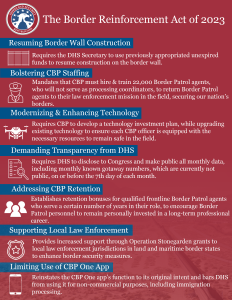The House Committee on Homeland Security has sent the Border Reinforcement Act of 2023 to the floor of the House of Representatives. The legislation, co-sponsored by all Homeland Security Republicans, aims to restore order at the Southwest border and prevent any further hit to operational readiness at the US’s Northern and maritime borders. The bill just passed on Thursday.
The Border Reinforcement Act of 2023 directs the Department of Homeland Security (DHS) to secure the borders by resuming border wall construction, expanding Border Patrol’s workforce to 22,000 agents, upgrading existing technology, and providing increased support to local law enforcement jurisdictions in land and maritime border states to enhance border security measures.
WATCH:
“I am proud every Republican member on this Committee helped deliver on our promise to the American people today by sending the Border Reinforcement Act of 2023 to the House floor,” said Homeland Security Chairman Mark E. Green, MD (R-TN). “This legislation takes a targeted approach to address Secretary Mayorkas’ record-breaking border crisis wreaking havoc between ports of entry at the Southwest border.”
“Addressing the single biggest threat to our homeland security should not be a partisan issue. Americans across the country, no matter how far they live from our borders, are affected by this crisis. It is time to pass this mission-critical legislation on the House floor and do what Secretary Mayorkas won’t—secure our border and keep Americans safe.”
It also requires DHS to disclose to Congress and make public all monthly data, including monthly known gotaway numbers, which are currently not public, on or before the 7th day of each month.
The border has once again become an issue. Last month Sen. Ted Cruz criticized Secretary of Homeland Security Alejandro Mayorkas for the crisis, accusing him of lacking integrity and allowing children to be r*ped. Mayorkas called Cruz’s comments “revolting.”

“Texans understand that the security of our border is not just a pie-in-the-sky talking point, it is quite literally life and death,” said Counterterrorism, Law Enforcement, and Intelligence Subcommittee Chairman August Pfluger (R-TX) on Friday. “I’m proud to have co-authored this plan that delivers on our promise to secure the border. Let’s build the wall, hire more border patrol officers, and finally understand who and what is crossing our border.”
The legislation also establishes retention bonuses for U.S. Border Patrol personnel who meet certain requirements to keep them protecting our country. Additionally, it reinstates the CBP One app’s function to its original intent by barring DHS from using it for non-commercial purposes, including immigration processing.
According to supporters of the bill, the legislation was developed with the firsthand insight gathered during the Committee’s border trips to El Paso, Texas, hearings, including a field hearing in Pharr, Texas with U.S. Border Patrol Chief Raul Ortiz, and conversations with numerous Border Patrol agents, border communities, and everyday Americans.
If the Border Reinforcement Act of 2023 passes both the House of Representatives and the Senate, it would then go to Biden for his signature. If he chooses not to sign it, he could veto the bill.
If the President vetoes the bill, it would go back to Congress for a potential override vote. To override a veto, two-thirds of both the House of Representatives and the Senate must vote in favor of the bill. If the override vote is successful, the bill becomes law without the President’s signature. If the override vote fails, the bill would not become law.
However, if the President chooses not to sign the bill, but also does not veto it, the bill would automatically become law after 10 days (excluding Sundays) of it being presented to the President. This is known as a “pocket veto.”

